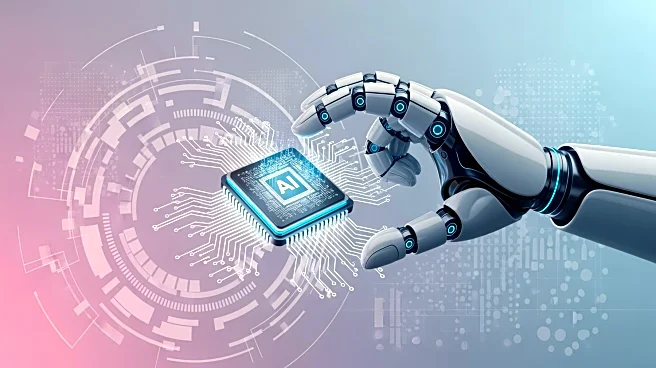What's Happening?
SoftBank, led by founder Masayoshi Son, has sold its entire $5.8 billion stake in Nvidia, a move that has surprised the business world. This decision is part of Son's strategy to focus on artificial intelligence,
including a planned $30 billion commitment to OpenAI and potential involvement in a $1 trillion AI manufacturing hub in Arizona. The sale of 32.1 million Nvidia shares comes at a time when the company's stock is near its peak valuation, marking SoftBank's second complete exit from Nvidia. The market reacted with Nvidia shares dropping nearly 3%, although analysts suggest the sale is not a negative stance on Nvidia but rather a strategic move to fund AI ambitions.
Why It's Important?
The sale of Nvidia shares by SoftBank is significant as it highlights the shifting focus of major investment firms towards artificial intelligence. This move could influence other investors and companies to reassess their positions in tech stocks and consider the growing AI sector. SoftBank's decision to invest heavily in AI could accelerate developments in the industry, potentially leading to advancements in technology and economic growth. However, it also raises questions about the stability of tech stocks like Nvidia, which may experience volatility as large stakeholders adjust their portfolios.
What's Next?
SoftBank's strategic shift towards AI investments suggests potential collaborations and developments in the AI sector, particularly with OpenAI and the proposed AI manufacturing hub in Arizona. This could lead to increased innovation and competition in the AI industry. Investors and market analysts will likely monitor SoftBank's moves closely, assessing the impact on Nvidia and other tech stocks. The broader market may experience fluctuations as stakeholders react to SoftBank's investment strategy and its implications for the future of AI technology.
Beyond the Headlines
SoftBank's decision to sell its Nvidia stake and focus on AI investments reflects broader trends in the tech industry, where AI is increasingly seen as a key driver of future growth. This shift may influence ethical and cultural dimensions, as AI technology raises questions about privacy, security, and the role of automation in society. The long-term impact of such investments could reshape industries, workforce dynamics, and global economic structures.









